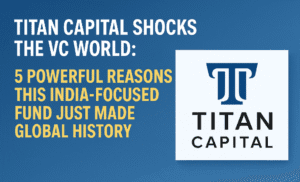Titan Capital Shocks the VC World: 5 Powerful Reasons This India-Focused Fund Just Made Global History
Rohit Bansal and Kunal Bahl, co-founders of Snapdeal, have propelled Titan Capital into global recognition as the sole India-focused VC on Business Insider’s 2025 Top 100 Early-Stage Investors list. Their transition from entrepreneurs to mentors defines Titan’s edge: a hands-on approach blending capital with hyper-local insights, helping startups navigate India’s complex market dynamics. By prioritizing sustainable growth over rapid scaling, they address critical gaps in sectors like fintech, D2C, and agritech, often overlooked by global investors.
This accolade signals India’s emergence as a hub of innovation, challenging the dominance of Western venture capital. Titan’s success underscores the value of homegrown expertise in unlocking markets where cultural nuance and regulatory agility matter. As India’s startup ecosystem matures—with over 100 unicorns and a shift toward profitability—Titan’s model inspires a new wave of localized investing. Their journey reflects a broader narrative: in emerging markets, resilience and contextual intelligence are as vital as capital, reshaping how the world views India’s role in global innovation.

Titan Capital Shocks the VC World: 5 Powerful Reasons This India-Focused Fund Just Made Global History
When Rohit Bansal and Kunal Bahl transitioned from building Snapdeal, one of India’s pioneering e-commerce giants, to launching Titan Capital in 2017, they brought more than just capital to the table. Their latest accolade—being named the sole India-focused venture capital firm on Business Insider’s 2025 Top 100 Early-Stage Investors list—highlights a pivotal shift in global venture capital dynamics, positioning India not just as a market for capital deployment but as a hub of investment innovation.
From Founders to Mentors: The Titan Capital Edge
Bansal and Bahl’s journey from entrepreneurs to investors has uniquely shaped Titan Capital’s philosophy. Unlike global funds that often prioritize rapid scaling, Titan’s strategy is rooted in resilience. Their hands-on mentorship model—born from their own trials with Snapdeal—focuses on navigating India’s complex regulatory, cultural, and operational landscape. For instance, Titan-backed startups like Goat Labs (a vernacular social media platform) and Zywa (a Gen Z neobank) credit the firm’s guidance in adapting products to India’s tier-2 and tier-3 markets, where global playbooks often fall short.
This founder-first approach resonates in a market where 70% of startups fail within five years due to misaligned growth strategies. By prioritizing unit economics and sustainable scaling, Titan fills a critical gap in India’s ecosystem, where mentorship is as scarce as early-stage funding.
Why Localized Expertise Matters
Titan’s exclusive focus on India contrasts with the geographic diversification of most top-tier VCs. This hyper-local strategy allows them to spot trends early, such as investing in D2C brands targeting India’s aspirational middle class or agritech solutions addressing fragmented supply chains. Their portfolio, spanning fintech, SaaS, and climate tech, reflects a nuanced understanding of India’s “next billion users”—a demographic often overlooked by global investors.
As global funds like Sequoia and SoftBank recalibrate their India strategies post-2022 valuation corrections, Titan’s success underscores the value of regional specialization. “India’s challenges—infrastructure gaps, regulatory nuances—require investors who’ve ‘been there,’” notes a Mumbai-based startup founder. “Titan’s team doesn’t just write checks; they problem-solve with you.”
The Bigger Picture: India’s VC Ecosystem Comes of Age
Titan’s recognition coincides with India’s rise as the world’s third-largest startup ecosystem. Over 100 unicorns, a maturing IPO pipeline, and a surge in profitable exits (like Mensa Brands’ public listing) signal a shift from “growth at all costs” to sustainable value creation. Titan’s inclusion in a global list dominated by Silicon Valley and European firms reflects this maturation, challenging the perception that emerging markets lack sophistication.
Yet challenges persist. While India saw $18 billion in VC inflows in 2024, early-stage funding remains fragmented. Titan’s model—combining seed capital with operational support—could inspire a new wave of homegrown funds targeting overlooked sectors like deep tech and climate innovation.
What’s Next for Indian Venture Capital?
Titan’s milestone is more than a badge of honor—it’s a validation of India’s potential to shape global innovation. As Bansal and Bahl leverage their platform to advocate for policy reforms (e.g., simpler ESOP taxation) and foster cross-border partnerships, their work could catalyze a broader movement.
For global investors, Titan’s success is a reminder: In markets as complex as India, local insights aren’t optional—they’re essential. For Indian founders, it’s proof that the next Flipkart or Ola might not need a foreign VC’s stamp of approval to go global.
As the ecosystem evolves, Titan Capital’s story offers a blueprint for blending entrepreneurial grit with investor discipline—a combination that could redefine India’s role in the global innovation economy.
Why This Matters
Titan Capital’s recognition isn’t just about two investors—it’s a testament to India’s growing ability to cultivate world-class startups and the investors who fuel them. In an era where localization trumps globalization, their journey underscores the power of homegrown expertise in unlocking emerging markets.
You must be logged in to post a comment.